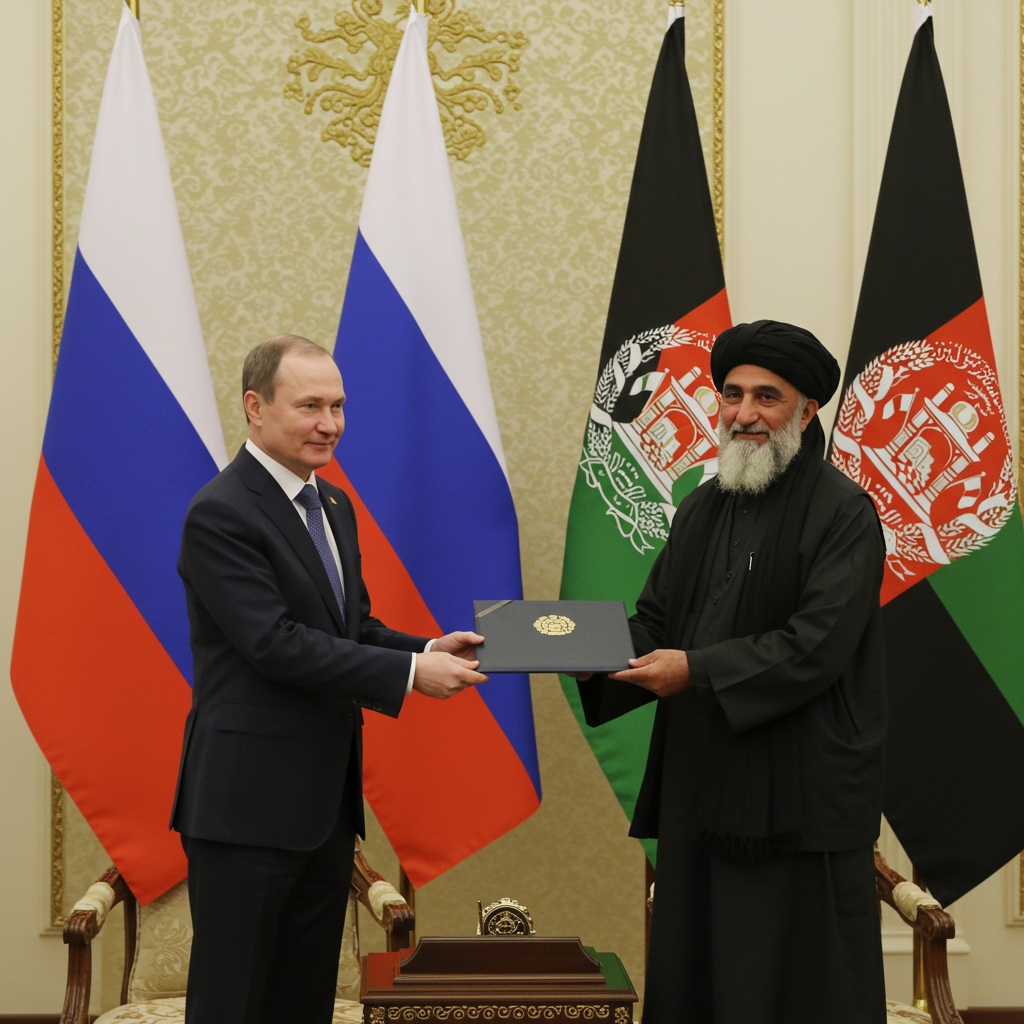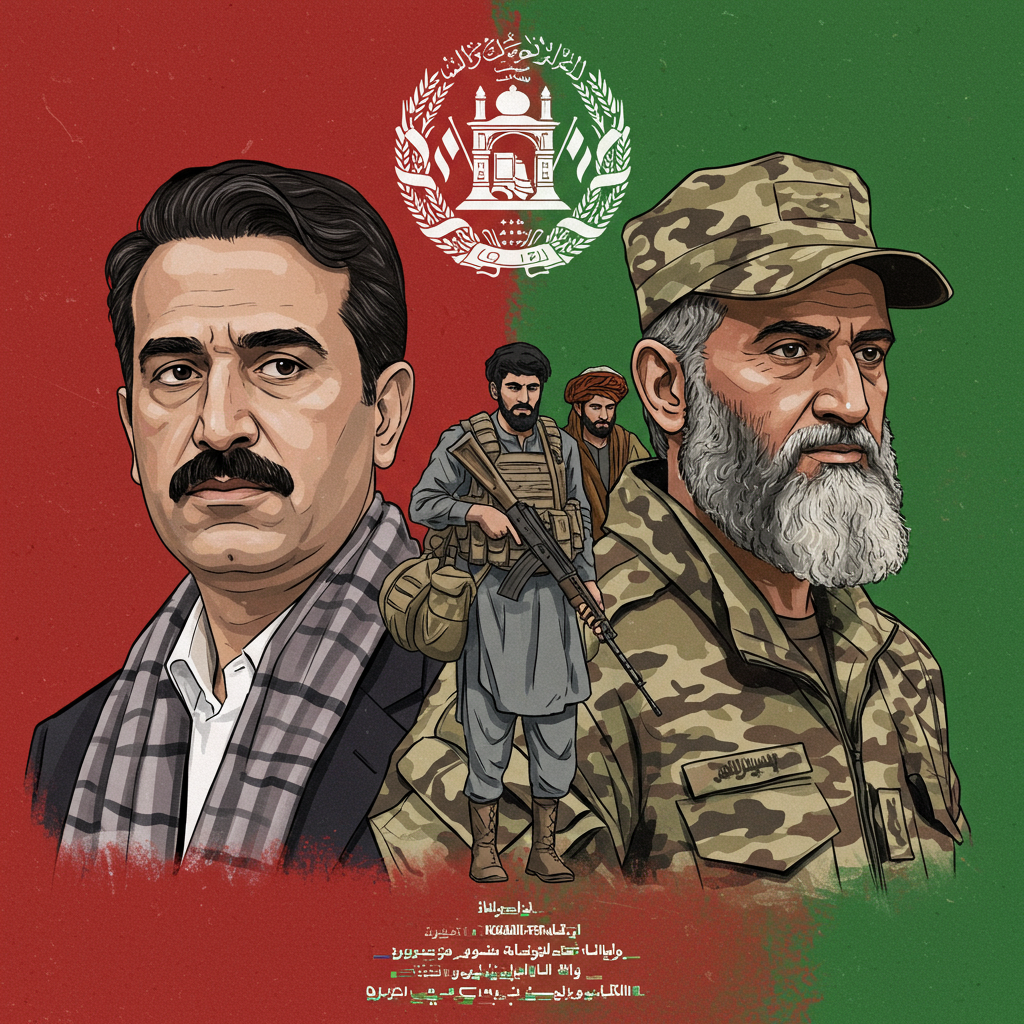In a move with significant geopolitical implications, Russia announced on Thursday, July 3, 2025, that it had officially recognized the taliban government in Afghanistan. This decision marks Russia as the first country to grant formal recognition to the group since they seized power in Kabul in August 2021 following the withdrawal of U.S. and NATO forces. The Russian Foreign Ministry confirmed the step after accepting the credentials of Afghanistan’s newly appointed Ambassador, Gul Hassan Hassan, in Moscow on July 4, 2025. Moscow stated this action is intended to spur “productive bilateral cooperation.” The Afghan embassy in Moscow subsequently replaced the former republic’s flag with the white flag of the Islamic Emirate of Afghanistan, signaling the shift.
russia’s Diplomatic Gamble: Why Now?
Russia’s decision comes nearly four years after the Taliban returned to power. For much of that time, the international community withheld formal recognition. Moscow’s move reflects a strategic calculus driven by multiple factors. The Russian Foreign Ministry highlighted potential benefits in security, counter-terrorism, and the fight against drug crime as key areas for collaboration. They also pointed to significant trade and economic opportunities, particularly within energy, transport, agriculture, and infrastructure sectors, expressing belief that recognition would boost bilateral cooperation.
This formal step follows a period of deepening engagement. Russia was one of the few countries that did not close its embassy in Kabul after the 2021 takeover. In 2022, Moscow became the first country to sign an international economic agreement with the Taliban, arranging supplies of oil, gas, and wheat. Notably, Russia removed the Taliban from its list of outlawed terrorist organizations in April 2025, paving the way for this recognition. Russian President Vladimir Putin referred to the Taliban as “allies in the fight against terrorism” in July 2024, highlighting a significant shift in rhetoric. The Russian Ambassador to Afghanistan, Dmitry Zhirnov, described the recognition as demonstrating Russia’s “sincere striving for the development of full-fledged relations with Afghanistan,” stating the decision was made by President Putin based on recommendations from Foreign Minister Sergey Lavrov.
Shared Security Concerns
A primary driver for Russia is the growing threat posed by Islamic State Khorasan (ISIS-K). Both Russia and the Taliban view ISIS-K as a major security risk in the region. Russia faces security threats from militant groups operating in Afghanistan and elsewhere. The devastating attack outside Moscow in March 2024, claimed by Islamic State and linked by U.S. officials to ISIS-K, underscored this vulnerability. The Taliban, for their part, claim they are actively working to eliminate ISIS presence within Afghanistan. This shared enemy has fostered a degree of practical cooperation between Moscow and Kabul despite their complex history.
Economic Opportunities
Beyond security, Russia sees economic potential in Afghanistan. The possibility of investments in rare earth minerals, a sector believed to be rich based on Soviet-era geological data, could be particularly attractive, especially for Russia’s defense industry. Developing infrastructure projects and trade links could also offer tangible benefits. A former senior Taliban official acknowledged that countries like Russia and China cannot provide the same level of financial support the U.S. did before 2021, emphasizing the continued need for Western financial engagement for significant relief. However, the economic ties being forged signal a strategic alignment.
The Taliban’s Response and Global Quest for Legitimacy
The Taliban administration welcomed Russia’s recognition warmly. Afghan Foreign Minister Amir Khan Muttaqi hailed it as a “courageous step.” He expressed hope it would serve as a “good example” and encourage other nations to follow suit. Taliban spokesperson Zabihullah Mujahid viewed the move as sending a “positive message to the rest of the world.” Gaining international recognition has been a core objective for the Taliban since taking control. Such recognition would ease their international isolation, potentially unlock frozen assets, and facilitate access to international aid and financial systems.
International Isolation Persists
Despite Russia’s move, the Taliban government remains largely isolated on the global stage. Most countries have withheld formal recognition. This hesitation stems primarily from the Taliban’s severe restrictions on human rights, particularly concerning women and girls. Since 2021, the administration has implemented strict interpretations of Islamic law. Girls over 12 are barred from education, women are prevented from holding many jobs and accessing public spaces, and restrictions are placed on female travel and even raising voices in public.
Western diplomats generally agree that a change in course on women’s rights is a prerequisite for broader international recognition. The UN has reported ongoing human rights violations, including public floggings, and stated that the policies impacting women amount to “gender apartheid.”
Varied Global Reactions and Engagement
Russia’s decision has drawn mixed reactions and highlights the diverse approaches nations are taking toward the Taliban.
China’s Stance
China, a traditional neighbor of Afghanistan, welcomed Russia’s recognition. China’s foreign ministry spokesperson Mao Ning stated Afghanistan should not be “excluded from the international community.” China’s engagement with the Taliban predates 2021, and ties have deepened since the takeover, including a significant oil extraction contract in 2023. While China recognized a former Taliban spokesperson as an official envoy in 2024, it has previously clarified this was not full government recognition. China also hosted a trilateral meeting with Pakistan and the Taliban in May 2025.
Other Regional Players
Several other neighboring and regional countries have engaged with the Taliban government despite not formally recognizing it.
The United Arab Emirates maintains designated ambassadors in Kabul.
Uzbekistan and Pakistan also have designated ambassadors. Pakistan’s relationship has been strained recently over accusations the Taliban harbors anti-Pakistan groups, leading to tensions, but engagement continues.
India, historically antagonistic towards the Taliban, has adjusted its approach since 2021, reopening its embassy and holding high-level meetings.
Iran, which also had hostile relations in the 1990s, now sees ISIS-K as a greater threat and has engaged with the Taliban since 2021.
Western Position and Criticism
Western nations generally maintain a cautious stance, emphasizing human rights concerns. Sanctions, including the freezing of approximately $9 billion in Afghanistan’s central bank assets in 2021 by the UN Security Council, remain in place. Germany’s interior minister recently expressed a desire to work directly with the Taliban on deporting convicted criminals, a position contrasting with the UN Human Rights Office, which advises against returns due to ongoing violations.
Critics of Russia’s recognition were vocal. Former Afghan officials and civil society figures condemned the move. Mariam Solaimankhail, a former parliament member, called it a “turning point” that legitimizes a regime linked to UN-sanctioned terrorists, prioritizing strategic interests over human rights. Naseer A. Faiq, the chargé d’affaires of Afghanistan’s UN mission, felt unsurprised but questioned the impact on the Afghan people suffering from poverty, suggesting it politically benefits the Taliban but harms the population long-term. Torek Farhadi highlighted Russia’s potential interest in rare earth minerals as a driver. Mohammad Halim Fidai described it as violating international norms and exposing flaws in the belief the Taliban had reformed, framing it as “authoritarian solidarity.” Fawzia Koofi warned it could legitimize impunity and endanger security, while the Afghan Women’s Political Participation Network called it legitimizing an “authoritarian, anti-women” regime.
A Complex History Resurfaces
Russia’s history with Afghanistan is fraught with conflict. The Soviet invasion in December 1979 to support a communist government led to a decade-long war against US-backed mujahideen fighters. This conflict resulted in significant Soviet casualties before their withdrawal in 1989 and left a deep scar on the region. The Afghan Women’s Political Participation Network referenced this history, stating Russia’s current support for the Taliban is a “continuation of those same destructive strategies.”
Implications and the Path Forward
Russia’s formal recognition is undoubtedly a significant win for the Taliban in their quest for international legitimacy. It strengthens Moscow’s geopolitical position in the region and challenges the united front of non-recognition maintained by most countries. Dr Rangin Dadfar Spanta, a former Afghan national security adviser, called the decision “regrettable” and predicted others might follow. While formal recognition from major Western powers remains unlikely as long as human rights restrictions persist, neighboring nations may be compelled to engage further or even recognize the Taliban due to “enforced realities” and strategic necessities like security and trade. The future trajectory of Afghanistan’s international standing will likely depend on a complex interplay of geopolitical interests and pressure regarding human rights.
Frequently Asked Questions
What does Russia formally recognizing the Taliban government mean?
Formal recognition by Russia means Moscow now considers the Taliban administration the legitimate governing body of Afghanistan. This allows for full diplomatic relations, including exchanging ambassadors, potentially unlocking channels for official bilateral cooperation in areas like trade, security, and economic development. Russia is the first country to take this step since the Taliban seized power in 2021.
Which other countries are most likely to follow Russia in recognizing the Taliban?
While no other country has formally recognized the Taliban government yet, neighboring nations like China, Pakistan, Uzbekistan, and Iran are considered potential candidates. These countries already maintain significant engagement, including designated ambassadors in Kabul, driven by strategic, security, and economic interests. China, in particular, welcomed Russia’s decision.
What are the main barriers preventing broader international recognition of the Taliban?
The primary obstacle to wider international recognition of the Taliban government is its human rights record, especially the severe restrictions imposed on women and girls. Policies barring girls from education past sixth grade and limiting women’s work and public life have drawn widespread condemnation. Many countries and international bodies, including the UN, state that these restrictions must be lifted or significantly eased before formal recognition can be considered.




